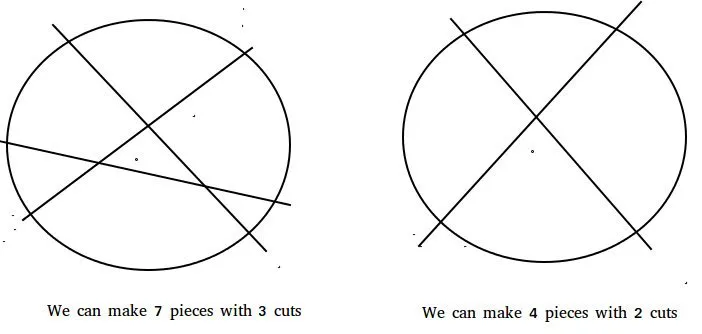Като се има предвид цяло число, обозначаващо броя на разфасовки, които могат да бъдат направени на палачинка, да се намерят максималния брой парчета, които могат да бъдат оформени чрез правене на N разрязвания.
Примери:
Input : n = 1 Output : 2 With 1 cut we can divide the pancake in 2 pieces Input : 2 Output : 4 With 2 cuts we can divide the pancake in 4 pieces Input : 3 Output : 7 We can divide the pancake in 7 parts with 3 cuts Input : 50 Output : 1276

Let f(n) denote the maximum number of pieces that can be obtained by making n cuts. Trivially f(0) = 1 As there'd be only 1 piece without any cut. Similarly f(1) = 2 Proceeding in similar fashion we can deduce the recursive nature of the function. The function can be represented recursively as : f(n) = n + f(n-1) Hence a simple solution based on the above formula can run in O(n).
Можем да оптимизираме по -горе формулата.
We now know f(n) = n + f(n-1) Expanding f(n-1) and so on we have f(n) = n + n-1 + n-2 + ...... + 1 + f(0) which gives f(n) = (n*(n+1))/2 + 1
Следователно с тази оптимизация можем да отговорим на всички заявки в O (1).
По -долу е прилагането на горната идея:
// A C++ program to find the solution to // The Lazy Caterer's Problem #include
// Java program to find the solution to // The Lazy Caterer's Problem import java.io.*; class GFG { // This function returns the maximum // number of pieces that can be made // form pancake using n cuts static int findPieces(int n) { // Use the formula return (n * (n + 1)) / 2 + 1; } // Driver program to test above function public static void main (String[] args) { System.out.println(findPieces(1)); System.out.println(findPieces(2)); System.out.println(findPieces(3)); System.out.println(findPieces(50)); } } // This code is contributed by Pramod Kumar
# A Python 3 program to # find the solution to # The Lazy Caterer's Problem # This function receives an # integer n and returns the # maximum number of pieces # that can be made form # pancake using n cuts def findPieces( n ): # Use the formula return (n * ( n + 1)) // 2 + 1 # Driver Code print(findPieces(1)) print(findPieces(2)) print(findPieces(3)) print(findPieces(50)) # This code is contributed # by ihritik
// C# program to find the solution // to The Lazy Caterer's Problem using System; class GFG { // This function returns the maximum // number of pieces that can be made // form pancake using n cuts static int findPieces(int n) { // Use the formula return (n * (n + 1)) / 2 + 1; } // Driver code public static void Main () { Console.WriteLine(findPieces(1)); Console.WriteLine(findPieces(2)); Console.WriteLine(findPieces(3)); Console.Write(findPieces(50)); } } // This code is contributed by Nitin Mittal.
// A php program to find // the solution to The // Lazy Caterer's Problem // This function receives // an integer n and returns // the maximum number of // pieces that can be made // form pancake using n cuts function findPieces($n) { // Use the formula return ($n * ( $n + 1)) / 2 + 1; } // Driver Code echo findPieces(1) 'n' ; echo findPieces(2) 'n' ; echo findPieces(3) 'n' ; echo findPieces(50) 'n'; // This code is contributed // by nitin mittal. ?> <script> // Javascript program to find the solution to // The Lazy Caterer's Problem // This function returns the maximum // number of pieces that can be made // form pancake using n cuts function findPieces(n) { // Use the formula return (n * (n + 1)) / 2 + 1; } // Driver Code document.write(findPieces(1) + '
'); document.write(findPieces(2) + '
'); document.write(findPieces(3) + '
'); document.write(findPieces(50)); </script>
Резултат:
2 4 7 1276
Референции: oeis.org
